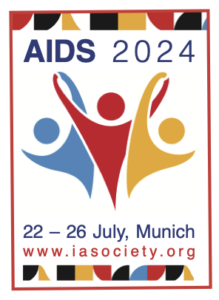HIV research to watch out for at the AIDS 2024 conference
18 July 2024. Related: Conference reports, World AIDS 25 Munich 2024.
Simon Collins, HIV i-Base
 This year the 25th International AIDS Conference (AIDS 2024) will be held from 22 – 26 July in Munich, Germany.
This year the 25th International AIDS Conference (AIDS 2024) will be held from 22 – 26 July in Munich, Germany.
This is the largest of the two conferences organised by the International AIDS Society (IAS), alternating each year with a smaller meeting more focussed on clinical research.
The programme for this year’s larger meeting has a stronger focus on treatment access, human rights and global health policy, and wider community involvement in the Global Village. This also raises challenges of visa applications that are often denied and sponsorship that is increasing scarce.
Numerous workshops are also being held just before the main conference including by IAS on a global HIV cure, but dozens of others cover every aspect of HIV-related research including HIV and ageing, the international chemsex crisis and practical approaches to U=U. [See also this detailed list of other cure-related research by Richard Jefferys]. Link to pre-conferences.
The conference theme of putting people first will be emphasised throughout the meeting including in the first plenary session that notably includes Kate Nambiar, Medical Director at THT. Many sessions will look at challenging the backlash against human rights including over gender, sexuality, young people, drug use and the rights of sex workers. Two sessions organised by Global Action for Trans Equality (GATE) include a workshop on including trans men in the HIV response and a symposium on better HIV care for trans communities.
i-Base will mainly report from Tracks B and C that cover clinical science and HIV prevention and this will include lots of diverse news. See below for a guide to other Tracks.
The programme is now online but abstracts unfortunately remain embargoed until Monday 23 July, 10am CET.
https://www.iasociety.org/conferences/aids2024 (website)
https://programme.aids2024.org/ (programme)
Based on the limited programme, highlights look likely to include the following research. Selected hyperlinks are included throughout.
- HIV cure-related research includes a new case of a new cure after stem cell transplantation in 2015 and having been off-ART for the last six years. Each of these cases generates new information about the mechanisms by which HIV is overcome in slightly different ways. In this case, the donor was only partially resistant to HIV infection, as the donor only had a single, rather than double, CCR5-delta32 mutation. Session. Abstract.
- The IAS pre-meeting on cure-related research will include some of the other approaches that are being studied for safer and easier ways that could be used by many more people.
- Several other sessions in the main programmes cover aspects of cure-related research including studies of the HIV reservoir and a chance to hear from Marc Franke, the third person to be cured of HIV, aka Düsseldorf Patient. And on cure research in Africa. And on gene therapy. Adam Castillejo, aka the London patient, the second person cured will also be here talking in this session.
- Studies of new drugs will include results from using lenacapavir as a long-acting PrEP. Top-line results reporting 100% efficacy from a subcutaneous injection given every six months were announced in a recent press release. The results presented at AIDS 2024 by Linda-Gail Bekker will attract headline news as much for the information on the two oral PrEP drugs used in the comparison arms as they will for lenacapavir itself. Session. No abstract currently linked.
- Other studies on new compounds are included in a separate oral abstract session. This will include dual therapy using lenacapavir with bictegravir, early phase 1 results of a new INSTI called VH-184, and use of long-acting CAB-LA/RPV-LA injectable ART in adolescents.
- Similar to HIV PrEP, results will be presented using doxycycline before sex to reduce the risk of bacterial STIs – as doxyPrEP. Up until now studies have only been using doxycycline after sex as DoxyPEP. This study looks at possible complications of drug resistance with doxy-PEP.
- Other studies will continue to look at using long-acting injectable cabotegravir (CAB-LA) as PrEP. We know it is both popular and effective for those with access – and the conference will hopefully include information about roll-out programmes globally, especially in high-incidence countries in Africa.
- Important aspects of global ART will also be covered including this symposium: What if one-size INSTI doesn’t fit all?
- Sessions on neurological complications always generate lively debate including this US-sponsored satellite meeting that includes European perspectives by Alan Winston (UCL London) and Magnus Gisslen (University of Gothenburg).
- An oral abstract session on complications including frailty and weight changes is being chaired by Tristan Barber (ICL, London).
- An interesting session on translational research related to inflammation and metabolic factors and ageing on ART is being led by long-standing US activist Jeff Taylor who has for many years led community responses in this field.
- Finally, the rapporteur summaries on the final day provide a highly compressed summary of research in each Track. Even with the best planning, most delegates only see half of the sessions they had planned to see, and those of us covering as press report even fewer. The community and leadership rapporteur summary this year will be given by UK activist Susan Cole who for many years has provided interviews and reports from IAS conferences for a wide range of community organisations, including NAM.
Track A Basic and translational science
Track B Clinical science
Track C Epidemiology and prevention science
Track D Social and behavioural sciences
Track E Implementation science, economics, systems and synergies
Track F Political science, laws, ethics, policies and human rights
References
All links are to the current online programme for the 25th International AIDS conference 2024 (AIDS 2024). The site includes a search open to highlight both sessions and abstracts. Abstract themselves are embargoed until 23 July 2024.
https://programme.aids2024.org/ (programme)
https://programme.aids2024.org/Search/Search? (search)

